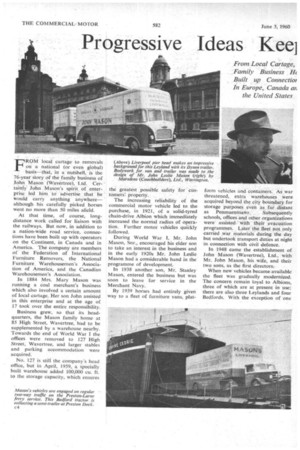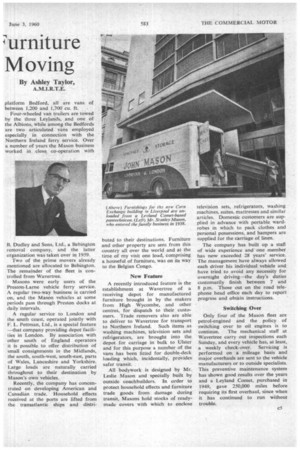Progressive Ideas Kee] urniture Moving
Page 54

Page 55

If you've noticed an error in this article please click here to report it so we can fix it.
By Ashley Taylor,
A.M.I.R.T.E.
FROM local cartage to removals on a national (or even global) basis—that, iri a -nutShell, is the 76-year story of the family business of John Mason(Wavertree), Ltd. Certainly John Mason's spirit of enterprise led him to advertise that he would carry anything anywhere— although his carefully picked horses went no more than 50 miles afield.
At that time, of course, longdistance work called for liaison with the railways. But now, in addition to a nation-wide road service, connections have been built up with operators on the Continent, in Canada and in America. The company are members of the Federation of International Furniture Removers, the National Furniture. Warehousemen's Association of America, and the Canadian Warehousemen's Association.
In 1884 Mrs. Mary Mason was running a coal merchant's business which also involved a certain amount of local cartage. Her son John assisted in this enterprise and at the age of 17 took over the entire responsibility.
Business grew, so that its headquarters, the Mason family home at 85 High Street, Wavertree, had to be supplemented by a warehouse nearby. Towards the end of World War I the offices were removed to 127 High Street. Wavertree, and larger stables and parking accommodation were acquired.
No. 127 is still the company's head office, but in April, 1959, a specially built warehouse added 100,000 cu. ft, to the storage capacity, which ensures
the greatest possible safety for customers property.
The increasing reliability of the commercial motor vehicle led to the purchase, in 1921, of a solid-tyred chain-drive Albion which immediately increased the normal radius of operation. Further motor vehicles quickly followed.
During World War I, Mr. John Mason, Snr., encouraged his elder son to take an interest in the business and in the early 1920s Mr. John Leslie Mason had a considerable hand in the programme of development.
In 1938 another son, Mr. Stanley Mason, entered the business but was soon to leave for service in the Merchant Navy.
By 1939 horses had entirely given way to a fleet of furniture vans, plat form vehicles and containers. As war threatened, extra warehouses were acquired beyond the city boundary for storage purposes even as far distant as Penmaenmawr. Subsequently schools, offices and other organizations were assisted –withl their evacuation programmes. Later the fleet not only carried war Materials during the day but undertook transport duties at night in connection with civil defence.
In 1948 came the establishment of John Mason (Wavertree), Ltd., with Mr. John Mason, his wife, and their two sons, as the first directors.
When new vehicles became available the fleet was gradually modernized. The concern remain loyal to Albions, three of which are at present in use there are also three Leylands and four Bedfords. With the exception of one B. Dudley and Sons, Ltd., a Bebington removal company, and the latter organization was taken over in 1959.
Two of the prime movers already mentioned are allocated to Bebington. The remainder of the fleet is controlled from Wavertree.
Masons were early users of the Preston-Larne vehicle ferry service. A regular two-way business is carried on, and the Mason vehicles at some periods pass through Preston docks at daily intervals.
A regular service to London and the south coast, operated jointly with F. L. Pettman, Ltd., is a special feature —that company providing depot facilities in London. By association with other south of England operators it is possible to offer distribution of small consignments in the Midlands, the south, south-west, south-east, parts of Wales, Lancashire and Yorkshire. Large loads are naturally carried throughout to their destination by Mason's own vehicles.
Recently, the company has concentrated on developing American and Canadian trade. Household effects received at the ports are lifted from the transatlantic ships and distri buted to their destinations. Furniture and other property are sent from this country all over the world and at the time of my visit one load, comprising a houseful of furniture, was on its way to the Belgian Congo.
New Feature
A recently introduced feature is the establishment at Wavertree of a receiving depot for manufactured furniture brought in by the makers from High Wycombe, and other centres, for dispatch to their customers. Trade removers also are able to deliver to Wavertree for transport to Northern Ireland. Such items as washing machines, television sets and refrigerators, are brought into the depot for carriage in bulk to Ulster and for this purpose a number of the vans has been fitted for double-deck loading which, incidentally, provides safer transit.
All bodywork is designed by Mr. Leslie Mason and specially built by outside coachbuilders. In order to protect household effects and furniture trade goods from damage during transit, Masons hold stocks of readymade covers with which to enclose television sets, refrigerators, washing machines, suites, mattresses and similar articles. Domestic customers are supplied in advance with portable wardrobes in which to pack clothes and personal possessions, and hampers are supplied for the carriage of linen.
The company has built up a stall of wide experience and one member has now exceeded 28 years' service. The management have always allowed each driver his individual vehicle and have tried to avoid any necessity for overnight driving—the day's duties customarily finish between 7 and 8 p.m. Those out on the road telephone head office each day to report progress and obtain instructions.
Switching Over
Only four of the Mason fleet are petrol-engined and the policy of switching over to oil engines is to continue. The mechanical staff at Wavertree carry out inspections each Sunday, and every vehicle has, at least, a weekly check-over. Servicing is performed on a mileage basis and major overhauls are sent to the vehicle manufacturers or to outside specialists. This preventive maintenance system has shown good results over the years and a Leyland Comet, purchased in 1949, gave 250,000 miles before requiring its first overhaul, since when it has continued to run without trouble.
















































































































